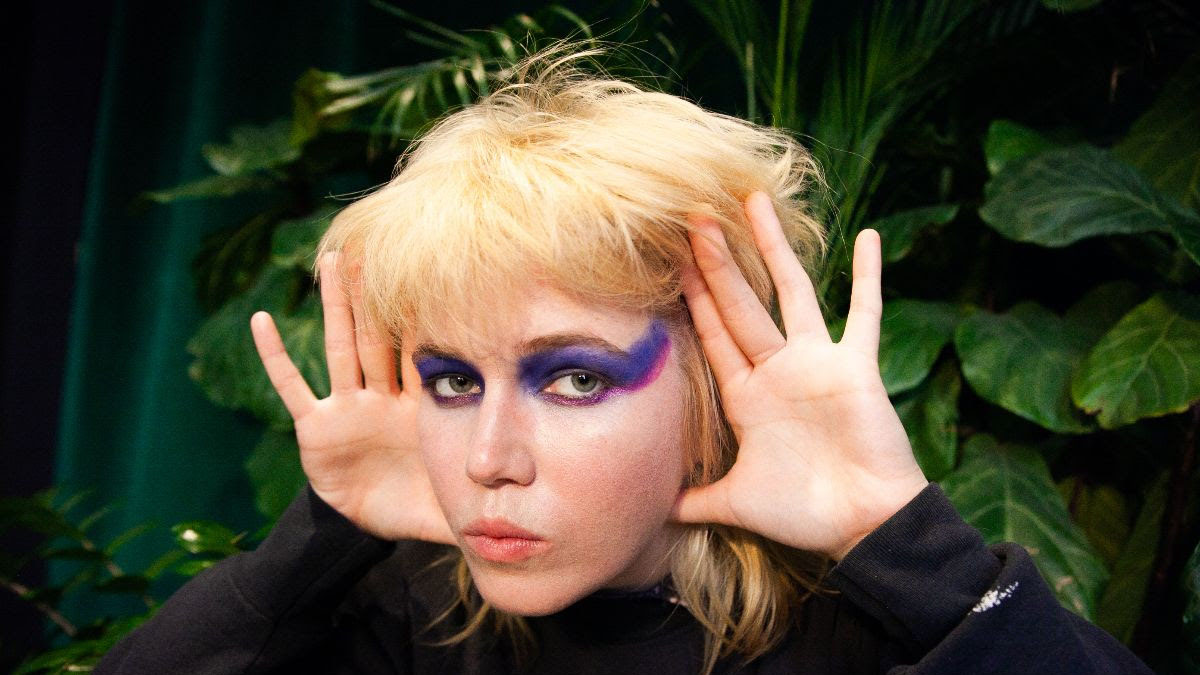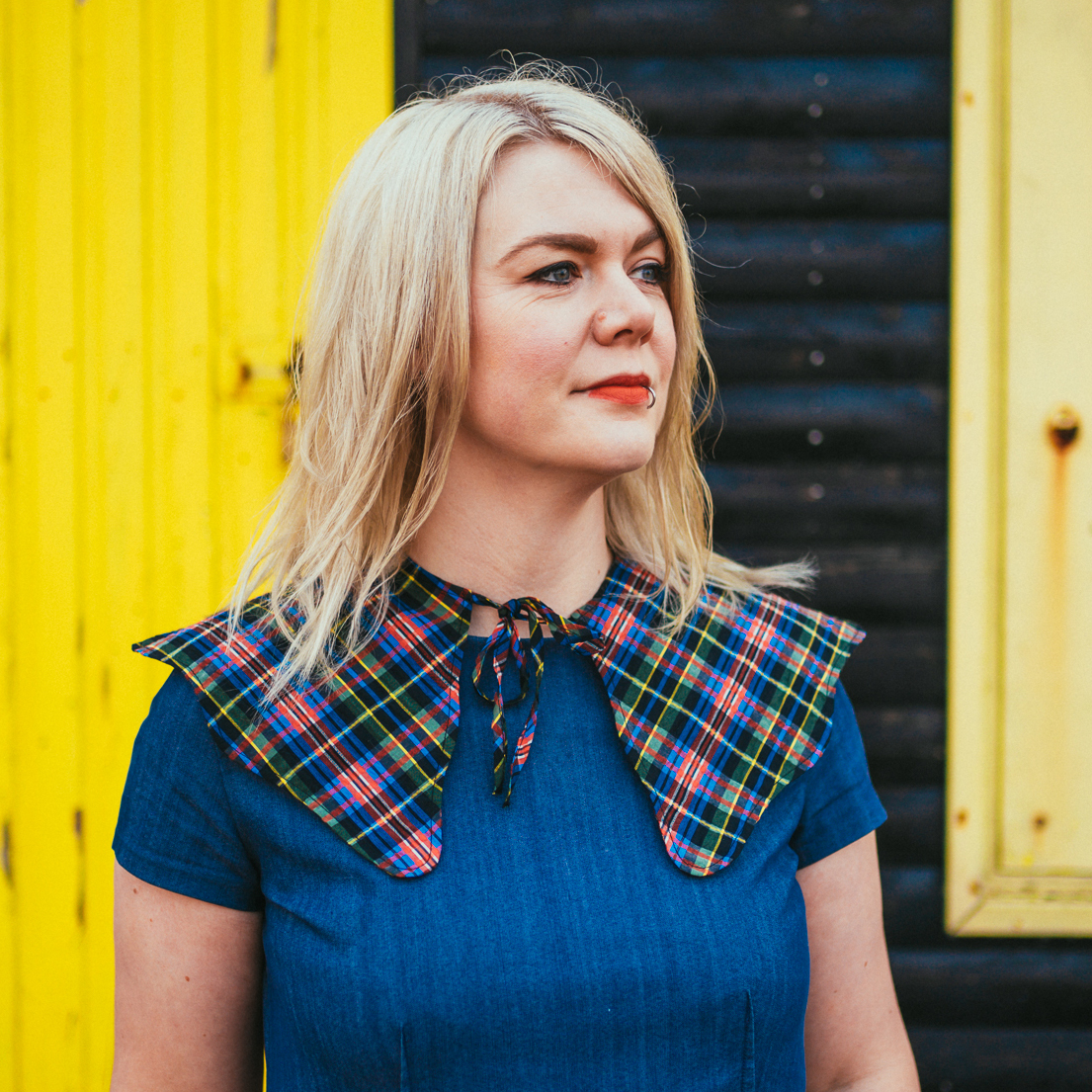Halsey guitarist Liv Slingerland emerges from the visceral heat of a pyro-laden pop show to discuss gear choices of a session ace and her debut solo LP, Hey You
The in-demand guitarist/bassist opens up about formative blues-rock jams, the pleasure of plugins, how to make it as a session player, and why she made Hey You now

As career trajectories go, Liv Slingerland’s is on fire. “I've never played with anybody that uses pyro before. It's viscerally hot on stage!” The Los-Angeles based alt-rock guitarist is dialing in from the tour van, currently pulled up outside Red Rocks, Colorado, as part of Halsey’s Love and Power Worldwide Tour.
But the chart-topping songwriter isn’t the only artist Slingerland is sharing the stage with. Since graduating from the University of Southern California in 2015, she’s lent her bass-playing skills to Aussie indie guitarist Alex Lahey and fellow L.A. music maker Laura Jane Ward.
And, as once-in-a-lifetime moments go, cradling her Ernie Ball Music Man St. Vincent Goldie as part of pop giant Olivia Rodrigo’s Saturday Night Live performance last year must be one of them.
Even with a blazing tour schedule, a debut of one’s own was always the goal for Slingerland. It just became a question of logistics, recording and refining the works across several L.A. studios over the past six years.
“I’ve been recording small EPs ever since I graduated from college, three to five songs here and there. [But] it would always depend on saving up enough money to book studio time with a producer I wanted to work with. It was a slow process,” she says matter of factly.
When my dad passed away and Covid started, I immersed myself in learning how to record at home
With such a transient state surrounding her, it took a moment of acute loss to reignite the spark for the project. Slingerland’s dad passed away from cancer in March of 2020, soon after California issued its stay-at-home orders and, with that, she finally hit pause to figure out that full length.
“When my dad passed away and Covid started, I immersed myself in learning how to record at home,” she admits. “I had all these ideas that I’d been working on and it was about putting them down on record.”
Get The Pick Newsletter
All the latest guitar news, interviews, lessons, reviews, deals and more, direct to your inbox!
Originally starting guitar lessons when she was just 11 years old, Slingerland recalls how serious her dad took the new passion.
“Once I started getting into it, he shifted his energy. He used to be into cars, like most dads. He was always searching up cars online and then he'd be looking up guitars, audio equipment and amps,” she says with a smile.
Alongside her dad, there was also another man instrumental in Slingerland’s deft handle of the fretboard during her self-coined “teenage tab years”.
I started studying with blues guitar teacher, John Garcia. He had played a lot with John Lee Hooker Jr but he also did session work for people like Bonnie Raitt
“I started studying with blues guitar teacher, John Garcia,” she says. “He had played a lot with John Lee Hooker Jr but he also did session work for people like Bonnie Raitt.”
The Grammy-nominated blues guitarist welcomed Slingerland to the local jam nights in San Jose. Suddenly she and her Dad found themselves heading north on Highway 5.
“All these older guys would be like, 'Take a solo here!' and I'd be like, 'Ah, I can't wait until this is over!'”, she remembers, sheepishly before acquiescing slightly. “But it made me comfortable with improvising and trying things without being afraid of failing.”
Slingerland’s debut album, Hey You, is doused in the spirit of those San Jose sets with a little pop-punk Y2K sprinkled into the mix. The title track channels Jack White's octave greatness with a clamouring crescendo chorus and Shouldn’t Bother dishes out a Who-style modulation pattern that builds into a hefty halftime stomp.
But it isn’t just road-house happy hour here. Clever channels the zeitgeist with Aziya’s studio slickness and a spot of Santigold synths. Then comes the closer, and arguably the album's highlight, Come Back To Me, with the rock and roll chops of heavily hyped Liverpool lot The Mysterines and a screeching solo that’s crying out for Slingerland’s own barren church scene in a desert prairie.
When it comes to gear, there are often multiple briefs to fulfill.
“For the artists I play with, the music director already has a setup,” she explains. “With Olivia, it was an Axe-Fx amp modeller multi-effects unit. For Halsey, we use Kemper. In the past, they've done a combination of a Kemper for the amp modelling and then a pedalboard.
For this tour, we’ve just done all Kemper so that it’s as streamlined as it can possibly be and there’s no chance of one pedal breaking in the line of 20 pedals, and you have to figure it out on the fly!
“But for this tour, we've just done all Kemper so that it's as streamlined as it can possibly be and there's no chance of one pedal breaking in the line of 20 pedals and you have to figure it out on the fly!”
For her solo music making, Slingerland is free to cultivate the pedals which she’s wholeheartedly embraced with a particular penchant for a certain designer audio producer.
“I have a handful of the Walrus pedals. There's the Walrus Arc 87 delay and then the one I most use is the Walrus Fathom (Multi-Function) Reverb,” she says. “Another artist I played with, Miya Folick, recommended them to me. I won't ever stop using them because there's this hold button that'll draw the reverb out over everything.”
Elsewhere on the ‘board, there are Fulltone OCD and an EarthQuaker Devices Plumes overdrive pedals. Slingerland will choose from one of two Music Man St. Vincent Goldies.
“For my live band, it’s usually the St. Vincent Goldie in red or all in white,” she says. “I got [the latter] four years ago now and that's the guitar I play mostly.”
While this summer has seen Slingerland performing in front of sold-out arenas against a backdrop of smoke and flames, the last few years have called for a more modest setup back in her L.A. apartment.
“When I record at home, there's a large component of it where I can't be loud so there are different plugins that I use, like the Neural DSP plugins,” she confides. “There are a lot of purists that still don't like that. But I feel like you can get the same or better results with the plugins because you have more control over editing.”
A post shared by Liv Slingerland (@livslingerland)
A photo posted by on
This feeling of influence plays a huge role in Slingerland’s session work as she flexes her fingerwork to recreates a swathe of other artists’ record production in a live setting. How does she grapple with that balance being a songwriter herself?
“Knowing how to keep the communication organized is really important,” she begins. “I see a lot of players come into situations and they have all these ideas but it's set up differently than that.
“The music director is the main correlation between you and the artist because if you have every single band member being like, ‘I think we should do this’, then nothing ever gets done. [Also] having the personality to be able to understand what the artist wants and translate that without stepping on toes.”

Her collaboration with Halsey, in particular, has given Slingerland a lot of scope to bring her own personality into the material. “Now that she’s gotten to know us and trusts us, there’s been some room during the tour for making a little moment here or there that we didn't necessarily decide upon in rehearsals,” she says.
For such a progressive pop maker, it’s not surprising to hear that no one show is ever quite the same. But then if those San Jose blues jams taught Slingerland anything, it is to lean into the discomfort.
“The band and I were reflecting on how different it is every night. There’s obviously a structure. But every single thing; the introductions, the way she speaks to the crowd, [even] the setlist. It keeps it refreshing for us too.”
- Under the Radar is out now via Righteous Babe.
Cheri Amour is a writer, editor and broadcaster intent on amplifying the voices of women and non-binary artists in print, online and on air. During her twenties, she played lead guitar in a touring two-piece, sharing the stage with The Slits and John Peel-approved punks The Nightingales. Formerly Deputy Editor at TGA Magazine, Cheri headed up its Tech section pouring over pedals with everyone to indie icon Debbie Smith (Echobelly/Curve) to multi-instrumentalist Katie Harkin (Sleater Kinney/Waxahatchee/Wye Oak). She's currently working on an upcoming 33 1/3 book on the unassuming influence of South Bronx sister troupe ESG, out in Spring 2023.
“There’d been three-minute solos, which were just ridiculous – and knackering to play live!” Stoner-doom merchants Sergeant Thunderhoof may have toned down the self-indulgence, but their 10-minute epics still get medieval on your eardrums
“There’s a slight latency in there. You can’t be super-accurate”: Yngwie Malmsteen names the guitar picks that don’t work for shred


![A black-and-white action shot of Sergeant Thunderhoof perform live: [from left] Mark Sayer, Dan Flitcroft, Jim Camp and Josh Gallop](https://cdn.mos.cms.futurecdn.net/am3UhJbsxAE239XRRZ8zC8.jpg)







